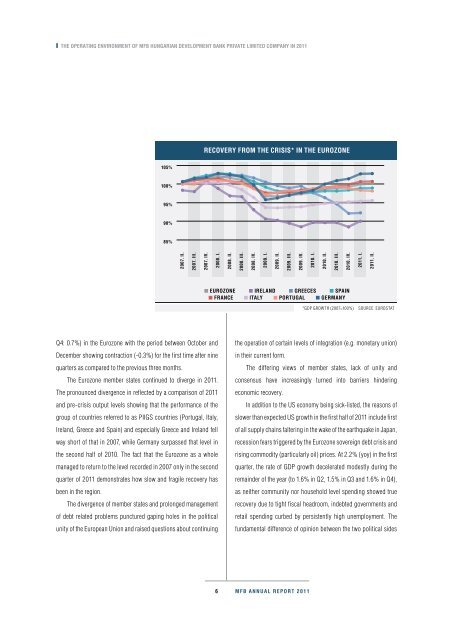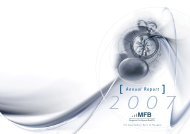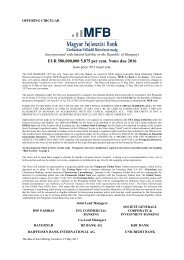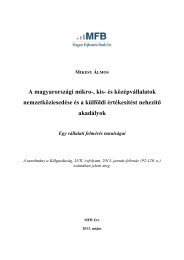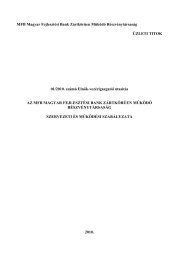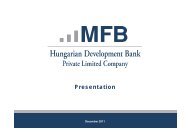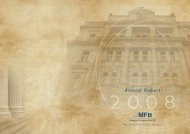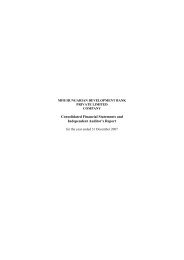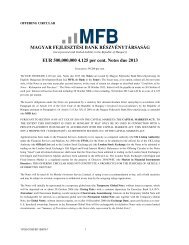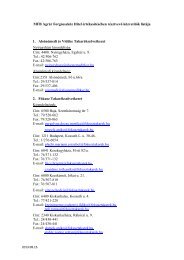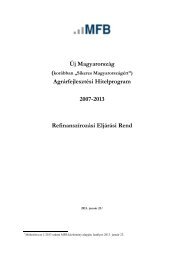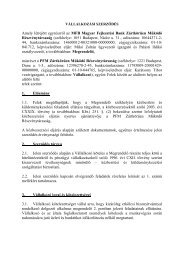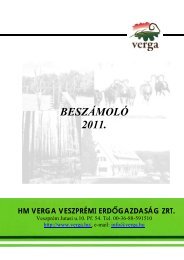ANNUAL REPORT 2011 - Magyar Fejlesztési Bank Zrt.
ANNUAL REPORT 2011 - Magyar Fejlesztési Bank Zrt.
ANNUAL REPORT 2011 - Magyar Fejlesztési Bank Zrt.
Create successful ePaper yourself
Turn your PDF publications into a flip-book with our unique Google optimized e-Paper software.
❙ THE OPERATING ENVIRONMENT OF MFB HUNGARIAN DEVELOPMENT BANK PRIVATE LIMITED COMPANY IN <strong>2011</strong><br />
<br />
<br />
<br />
<br />
<br />
<br />
<br />
<br />
<br />
<br />
<br />
<br />
<br />
<br />
<br />
<br />
<br />
<br />
<br />
<br />
<br />
<br />
<br />
n n n n <br />
n n n n <br />
*GDP GROWTH (2007=100%)<br />
SOURCE: EUROSTaT<br />
Q4: 0.7%) in the Eurozone with the period between October and<br />
December showing contraction (-0.3%) for the first time after nine<br />
quarters as compared to the previous three months.<br />
The Eurozone member states continued to diverge in <strong>2011</strong>.<br />
The pronounced divergence in reflected by a comparison of <strong>2011</strong><br />
and pre-crisis output levels showing that the performance of the<br />
group of countries referred to as PIIGS countries (Portugal, Italy,<br />
Ireland, Greece and Spain) and especially Greece and Ireland fell<br />
way short of that in 2007, while Germany surpassed that level in<br />
the second half of 2010. The fact that the Eurozone as a whole<br />
managed to return to the level recorded in 2007 only in the second<br />
quarter of <strong>2011</strong> demonstrates how slow and fragile recovery has<br />
been in the region.<br />
The divergence of member states and prolonged management<br />
of debt related problems punctured gaping holes in the political<br />
unity of the European Union and raised questions about continuing<br />
the operation of certain levels of integration (e.g. monetary union)<br />
in their current form.<br />
The differing views of member states, lack of unity and<br />
consensus have increasingly turned into barriers hindering<br />
economic recovery.<br />
In addition to the US economy being sick-listed, the reasons of<br />
slower than expected US growth in the first half of <strong>2011</strong> include first<br />
of all supply chains faltering in the wake of the earthquake in Japan,<br />
recession fears triggered by the Eurozone sovereign debt crisis and<br />
rising commodity (particularly oil) prices. At 2.2% (yoy) in the first<br />
quarter, the rate of GDP growth decelerated modestly during the<br />
remainder of the year (to 1.6% in Q2, 1.5% in Q3 and 1.6% in Q4),<br />
as neither community nor household level spending showed true<br />
recovery due to tight fiscal headroom, indebted governments and<br />
retail spending curbed by persistently high unemployment. The<br />
fundamental difference of opinion between the two political sides<br />
6<br />
MFB <strong>ANNUAL</strong> <strong>REPORT</strong> <strong>2011</strong>


